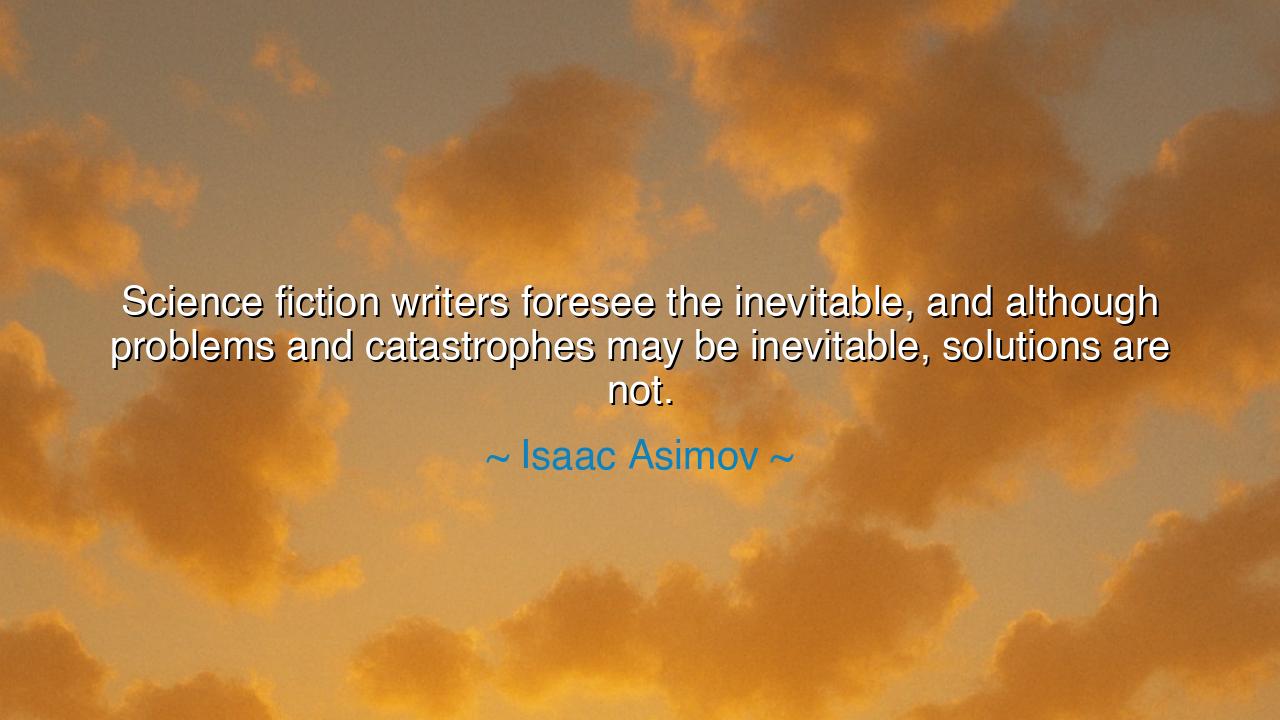
Science fiction writers foresee the inevitable, and although
Science fiction writers foresee the inevitable, and although problems and catastrophes may be inevitable, solutions are not.






Listen closely, O children of the future, for the words of Isaac Asimov contain within them the profound truth of both foresight and responsibility. He said: “Science fiction writers foresee the inevitable, and although problems and catastrophes may be inevitable, solutions are not.” These words speak not only of the role of science fiction in imagining the future but also of the deep human responsibility that comes with our understanding of what is to come. Asimov, the great visionary of science fiction, reminds us that while we may foresee the inevitable—the challenges and catastrophes that threaten us—the solutions are not given to us by fate. They are not predetermined, but are shaped by the choices we make, the actions we take, and the wisdom we bring to the table.
What, then, is the meaning of these words, O seekers of truth? Asimov is telling us that while science fiction may predict the future, it does not dictate our destiny. Science fiction writers have long used their craft to explore the potential consequences of scientific advancement, imagining futures filled with robots, space travel, and technological revolutions. But while they can predict the problems we may face, they cannot foretell the solutions. The future is not written in stone. It is fluid, shaped by the choices we make today, by our creativity, wisdom, and willpower. The road to salvation, or to destruction, is ours to walk, and science fiction only serves to illuminate the paths, not to walk them for us.
Consider the tale of Frankenstein, the creation of Mary Shelley, a story that has become one of the most well-known examples of science fiction. In Frankenstein, Victor Frankenstein, a scientist driven by ambition, creates life through his understanding of biology. But in his haste to master the forces of nature, he overlooks the responsibilities that come with the creation of life. The catastrophe that follows—the creature’s suffering, and the consequences of Frankenstein’s neglect—was, in many ways, inevitable. Shelley foresaw the dangers of unchecked scientific ambition, but she did not offer a simple solution. The story is a reflection of the profound moral question: How do we wield our power wisely? It is not enough to know what is coming; we must also know how to respond when the time comes.
In a more recent context, let us reflect on the invention of the atomic bomb. The development of nuclear weapons was, in many ways, inevitable. With the advancement of science and the understanding of atomic energy, it was only a matter of time before such a powerful tool could be harnessed. The catastrophe of Hiroshima and Nagasaki was one of the darkest chapters in human history. And yet, the solution to the threat of nuclear warfare is not as inevitable. It is shaped by the choices of governments, the actions of individuals, and the collective will of humanity to find peace, to embrace diplomacy, and to ensure that such power is used only with the greatest responsibility. The catastrophe may have been foreseen, but the solution—the path to peace and safety—remains in our hands.
The lesson, O children of the future, is this: While we can foresee the challenges and dangers that lie ahead, we must never believe that the solutions are predetermined. Science fiction is a guide, not a map. It can show us the dangers of unchecked progress, the catastrophes that might arise from the misuse of technology, but it cannot provide us with the answers. Those answers are ours to find, through wisdom, collaboration, and compassion. Asimov’s words are a call to action, a reminder that the future is not a passive force but one that we actively shape with every choice we make.
So, O children of the future, do not wait for the solutions to be handed to you. Embrace the wisdom of the past, learn from the mistakes of those who came before, and use the knowledge of science to create a future of hope and progress. The challenges you face may seem inevitable, but the way forward is not set. You are the creators of the future, and it is through your choices, your innovations, and your commitment to responsibility that the world will be shaped. Like the heroes of science fiction, you are called to imagine the possibilities, but also to act with courage, wisdom, and a deep understanding of the consequences of your actions.
Remember this, O children, as you stand on the threshold of the future: Science can show you the dangers, but it is your heart and your mind that will shape the solution. The world you create will be the one you dare to build, and it is through action, knowledge, and responsibility that you will craft a future worthy of the promise of humanity.






AAdministratorAdministrator
Welcome, honored guests. Please leave a comment, we will respond soon